
Joan Mary Waller Greenwood was an English actress. Her husky voice, coupled with her slow, precise elocution, was her trademark. She played Sibella in the 1949 film Kind Hearts and Coronets, and also appeared in The Man in the White Suit (1951), Young Wives' Tale (1951), The Importance of Being Earnest (1952), Stage Struck (1958), Tom Jones (1963) and Little Dorrit (1987).
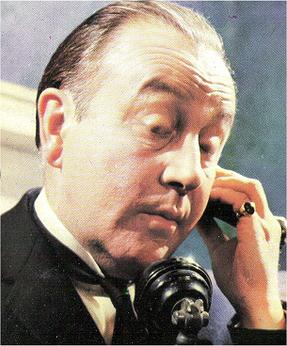
Dennistoun Franklyn John Rose Price was an English actor. He played as Louis Mazzini in the Ealing Studios film Kind Hearts and Coronets (1949) and the omnicompetent valet Jeeves in 1960s television adaptations of P. G. Wodehouse's stories.

Margaret Mary Day Lockwood, CBE, was an English actress. One of Britain's most popular film stars of the 1930s and 1940s, her film appearances included The Lady Vanishes (1938), Night Train to Munich (1940), The Man in Grey (1943), and The Wicked Lady (1945). She was nominated for the BAFTA Award for Best British Actress for the 1955 film Cast a Dark Shadow. She also starred in the television series Justice (1971–74).
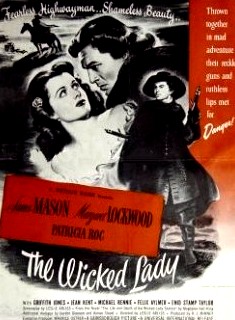
The Wicked Lady is a 1945 British costume drama film directed by Leslie Arliss and starring Margaret Lockwood in the title role as a nobleman's wife who becomes a highwaywoman for the excitement. The film had one of the largest audiences for a film of its period, 18.4 million.

Jean Kent, born Joan Mildred Field was an English film and television actress.
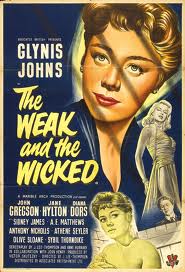
The Weak and the Wicked is a 1954 British drama film directed by J. Lee Thompson based on the autobiographical novel Who Lie in Gaol by his wife, Joan Henry, starring Glynis Johns and Diana Dors.
Bernard Knowles was an English film director, producer, cinematographer and screenwriter. Born in Manchester, Knowles worked with Alfred Hitchcock on numerous occasions before the director emigrated to Hollywood.

A Place of One's Own is a 1945 British film directed by Bernard Knowles. An atmospheric ghost story based on the 1940 novel of the same title by Osbert Sitwell, it stars James Mason, Barbara Mullen, Margaret Lockwood, Dennis Price and Dulcie Gray. Mason and Mullen are artificially aged to play the old couple. It was one of the cycle of Gainsborough Melodramas.
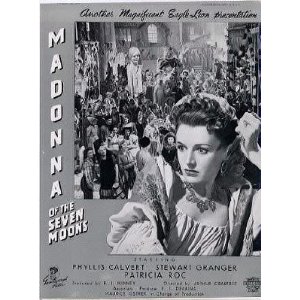
Madonna of the Seven Moons is a 1945 British drama film starring Phyllis Calvert, Stewart Granger and Patricia Roc. Directed by Arthur Crabtree for Gainsborough Pictures, the film was produced by Rubeigh James Minney, with cinematography from Jack Cox and screenplay by Roland Pertwee. It was one of the Gainsborough melodramas of the mid-1940s popular with WW2-era female audiences.

Caravan is a 1946 British black-and-white drama film directed by Arthur Crabtree. It was one of the Gainsborough melodramas and is based on the 1942 novel Caravan by Eleanor Smith.

The Bad Lord Byron is a 1949 British historical drama film about the life of Lord Byron. It was directed by David MacDonald and starred Dennis Price as Byron with Mai Zetterling, Linden Travers and Joan Greenwood.

The Magic Bow is a 1946 British musical film based on the life and loves of the Italian violinist and composer Niccolò Paganini. It was directed by Bernard Knowles. The film was entered into the 1946 Cannes Film Festival.
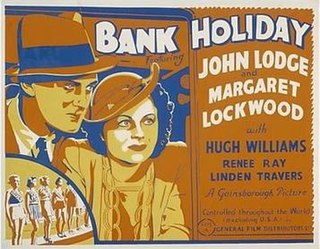
Bank Holiday is a 1938 British drama film directed by Carol Reed and starring John Lodge, Margaret Lockwood, Hugh Williams and Kathleen Harrison.

Hungry Hill is a 1947 British film directed by Brian Desmond Hurst and starring Margaret Lockwood, Dennis Price, and Cecil Parker with a screenplay by Terence Young and Daphne du Maurier, from the 1943 novel by Daphne du Maurier.

Harold Huth was a British actor, film director and producer.
Highly Dangerous is a 1950 British spy film starring Margaret Lockwood and Dane Clark. It was directed by Roy Ward Baker, based on a screenplay and original story written by Eric Ambler.

Cardboard Cavalier is a 1948 British historical comedy film directed by Walter Forde and starring Sid Field, Margaret Lockwood and Jerry Desmonde.
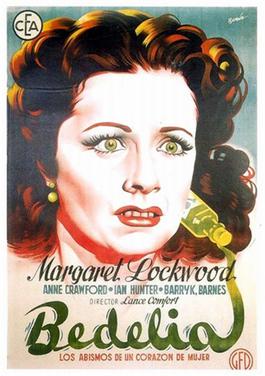
Bedelia is a 1946 British melodrama film directed by Lance Comfort and starring Margaret Lockwood, Ian Hunter and Barry K. Barnes. It is an adaptation of the 1945 novel Bedelia by Vera Caspary with events relocated from the United States to Monaco and England.
Kyra Knopmuss; Kyra Vayne was a Russian-born British opera singer.

The Feminine Touch is a 1956 colour British drama film directed by Pat Jackson and starring George Baker, Belinda Lee and Delphi Lawrence. In 1957 it was released as A Lamp Is Heavy in Canada, and The Gentle Touch in the United States.

















